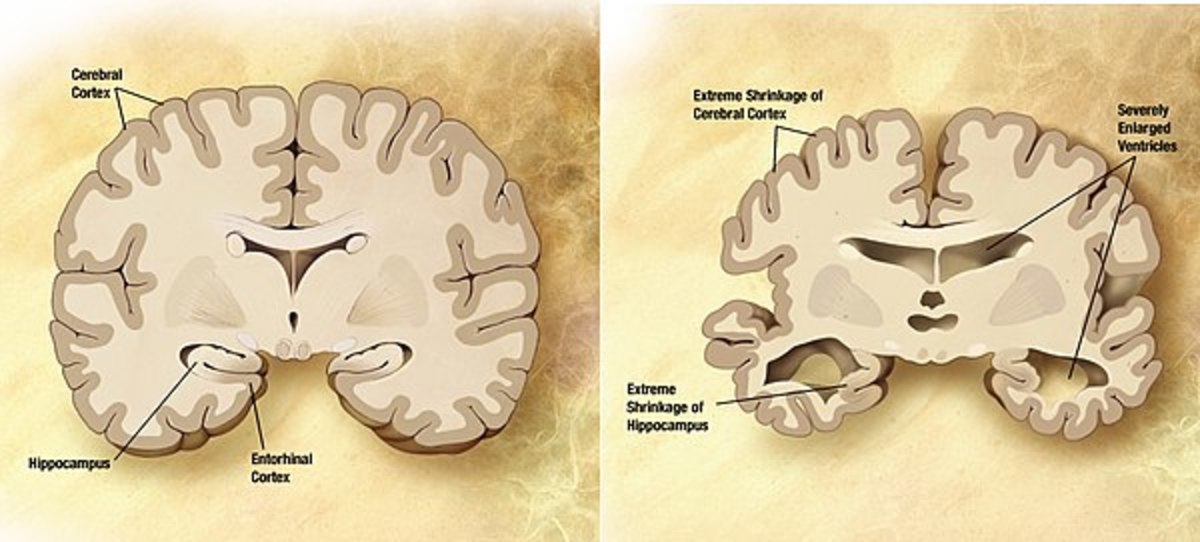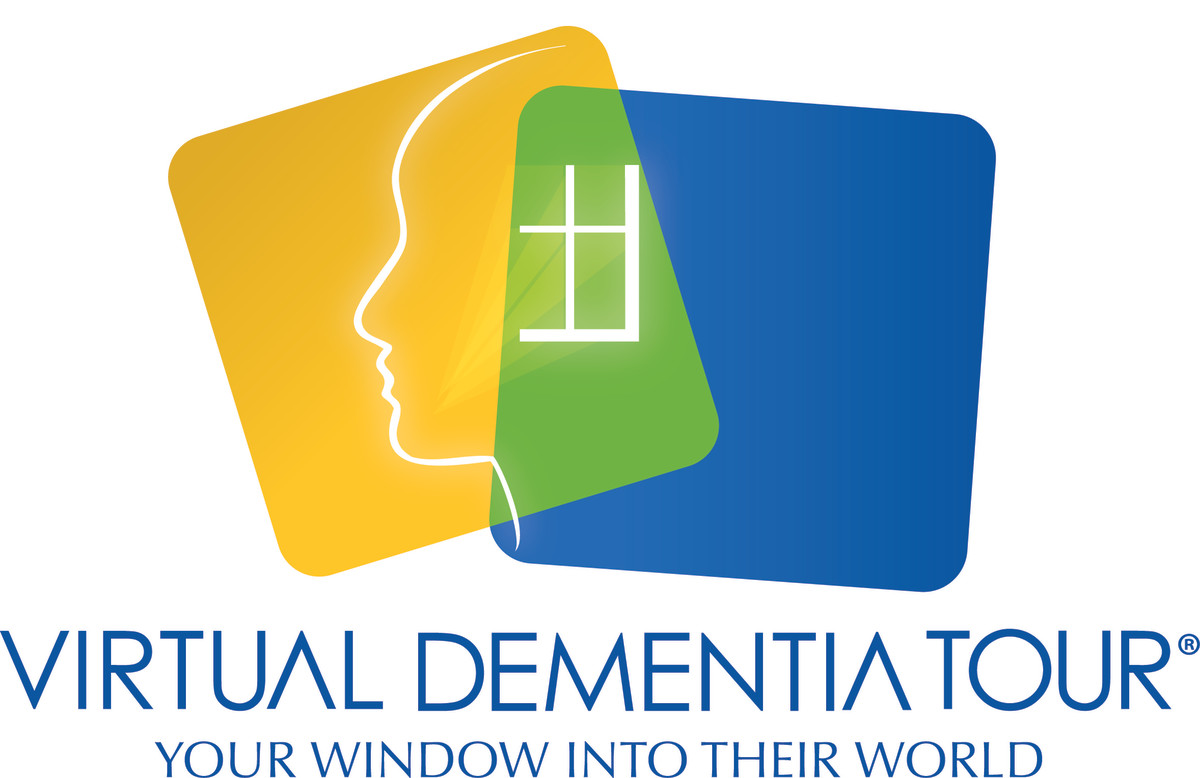Helping Mom Deal With Early Stage Alzheimers
I guess it's stereotypical (rightfully so) for people to imagine anyone dealing with Alzheimers disease as being completely confused, disoriented, or down right forgetful. Well in most cases this sadly eventually becomes true, but I'd like to share my recent and ongoing experience regarding the beginning stages of this disease. I think if I had known more about early signs I probably could've helped my Mom acknowledge and deal with this much sooner.
It was confirmed today as I accompanied my Mom to her Neurology consult that she is in fact dealing with very early stages of Alzheimers. It all began (for me anyway) 4 months ago. My Mom had asked me, "Oh yeah, I think I told you already but I came back from vacation and...I got back to work and couldn't remember how to type. Can you come with me to my doctor's appointment?" I replied that I would, of course. "But what do you mean, you can't type?" I asked. Figuring she was just slowing down, or forgetting a letter or two. "I don't know, I sat at my desk and looked at the keyboard, and had no idea where all the keys were." she expained very noncholantly.
It was the same look and smile I'd seen on her face many times before with a kind of half shrug as she replied to me. But something didn't quite fit. I had to dig in a little deeper, otherwise that was the best detailed description of her "forgetting how to type" would've been described. So I asked, "Okay so if I sat you in front of the keyboard and asked you to type your name, how would you do?" My mom pursed her lips sideways, eyebrows raised and with shoulders shrugged once again replied, "I couldn't. I'd have to look at the keyboard." At this moment, I realized something was wrong. Nobody just forgets how to type out of the blue. Especially if like my mom, you've been typing like a hundred words a minute very accurately since you were sixteen. A million questions flew into my mind as this conversation continued.
She went on to explain, after I'd asked her how she is possibly getting by at work everyday not being able to type. She pretty much types all day long in her office with plenty of deadlines to meet. Apparently she had friends at work that were helping her. As for the vacation she went on, guessing the time frame I had assumed that her "forgetting how to type incident" happened either after Thanksgiving or Christmas vacation. Mind you, the initial appointment I went to with her regarding this was in March, which was 4 months ago. To make matters worse, my mom (who has always been praised for her work ethic and ability always receiving raises and bonuses) had been recently evaluated by her supervisor resulting in her being poorly reviewed. I found out through comparing stories with her boyfriend, that she had actually mentioned trouble with typing last year in May! He hadn't taken it seriously himself due to her brief vague explanation. She had forgotten that she even mentioned it to him last year, thinking that this is a very recent matter.
I knew that my Mom really needed my help, so I stepped up immediately. First thing I made sure of was to get her off of work. My concern was her losing her job based off of performance that was obviously affected by her memory loss. Though she explained this to her boss, the bottom line is (in my eyes) though you have some problem going on, as long as you continue to show up at work, your performance is still going to be evaluated compared to anything prior. So with the help of her doctor, the first action made was to put her on disability until we could find out what was going on.
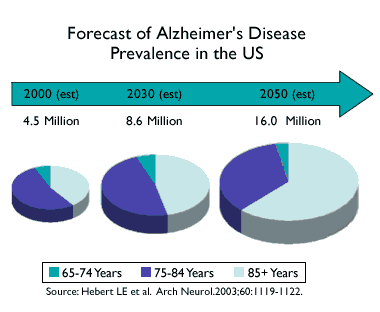
I thought of all the harmless forgetful incidents that I could recall of my Mom. You know, things like forgetting where she put her keys or purse, forgetting certain things to pick up at the store, or forgetting to call back a friend. Oh and let's not forget to mention the more humorous moments like asking the grandkids where her glasses are when they're sitting on top of her head. These are all things that some of us deal with every now and then sometimes, but I realized that I seemed to notice them more often with my mom as far as a few years back. So it became almost like our little joke (my Mom's included of course) that she would always forget. We'd all laugh and make a funny remark and she'd chime in and laugh it off as well. I didn't realize at the time that it was turning into something more serious.
I live across town from my Mom and see her quite often. At least once a week she'd either come over or we'd go by if not meet up to go shopping or eat out. She spent a lot of time with my kids, so she's around often but I didn't see her everyday. I think it was about a year or two ago that my brother (who lives with her) started to mention of her forgetfulness. But it was never anything that called to my attention so much until this typing incident.
So since that first appointment regarding this, I've offered my Mom to stay with us in my home while we figure out what is going on. I don't have to work everyday and am home full time for my family, so it made sense to me since she was going to be off of work that she would be here at my home instead of at her house by herself most of the time. I saw it as an opportunity to be able to closely evaluate what goes on everyday with her. It's been since then that my eyes have really opened up to how much her memory has been affected.
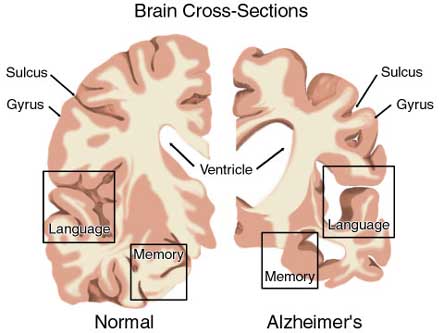
Things I'm noticing most being affected by her memory loss seem to be mainly her cognitive skills. I took on keeping track of her appointments and handling any of her disability paperwork. Things that unfortunately I know would not have been handled in a timely matter or just completely forgotten if taken care of by her. Within these 4 months we have discovered that signing her signature is very difficult for her to do. I noticed that she could write normally, but her signature was something that took much concentration for her. Things like using her credit card, checking the voicemail on her cell phone, using the remote control for the t.v., using the microwave, were all actions that needed repetative explanations. Thankfully, she's able to read without any problems. She loves to read! Unfortunately though, she's unable to enjoy doing any sudoku games or word search/crossword puzzles. We've noticed the increased difficulty in attempting to execute those. Those games and puzzles were things she used to do ALL the time. I'm noticing more and more now that certain points have to be repeated in a 5 minute conversation sometimes 2-3 times with her. She was instructed by the doctor today that she should no longer be driving. This was actually discussed by my Mom and I a month or so ago, so today's apppointment confirmed our thoughts.
My Mom is only 57 years old. If you were to speak with her right now, she is definitely not what you'd think of when the word Alzheimers comes to mind. In fact, most people probably wouldn't even consider that with her if only dealing with her for short periods of time. It wasn't until she'd been living with me these past 4 months that these symptoms have become more and more apparent to me.
There is so much information about my journey with her and beginning stages of Alzheimers that we're dealing with, it's hard to share every little bit. But I do know, that it's been put in my heart to share what I can. Dealing with early stages of Alzheimers is very frustrating for my Mom, for anyone having to deal with it. Imagine the frustration of not only having difficulty with certain areas in your life that once were second nature, and at the same time knowing that they are slowly slipping away for good.
Different stages of Alzheimers disease
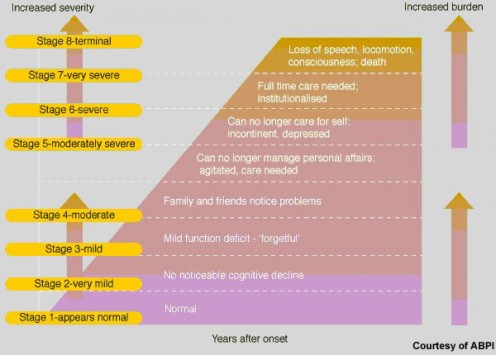
As for the clinical side of this, there are medications for memory loss geared towards Alzheimers symptoms. These will not cease the memory loss, but will be effective in slowing down the progression of it. My Mom is taking two different kinds. According to the Neurologist, my Mom showed no signs of any stroke or brain tumor after reviewing her brain CT scans. Based off of Psychology testing regarding memory skills, as well as her primary care doctor, and his own physical and memory testing, we've resulted in being given a diagnosis of early stage Alzheimers.
This is just the beginning for us all in dealing with this disease. I've learned that Alzheimers disease is not a natural part of the aging process. It's a progressive, irreversible, brain disorder with no known cause or cure. Symptoms of the disease include memory loss, confusion, impaired judgment, personality changes, disorientation, and loss of language skills. Early detection is very important for more effective treatment regarding this disease and other forms of cognitive impairment. Here are some things to look out for:
Warning Signs of Alzheimer's Disease
- Trouble with new memories
- Relying on memory helpers
- Difficulty finding words
- Struggling to complete familiar tasks
- Confusion about time, place or people
- Misplacing familiar objects
- Onset of new depression or irritability
- Making bad decisions
- Personality changes
- Loss of interest in important responsibilities
- Seeing or hearing things
- Expressing false beliefs
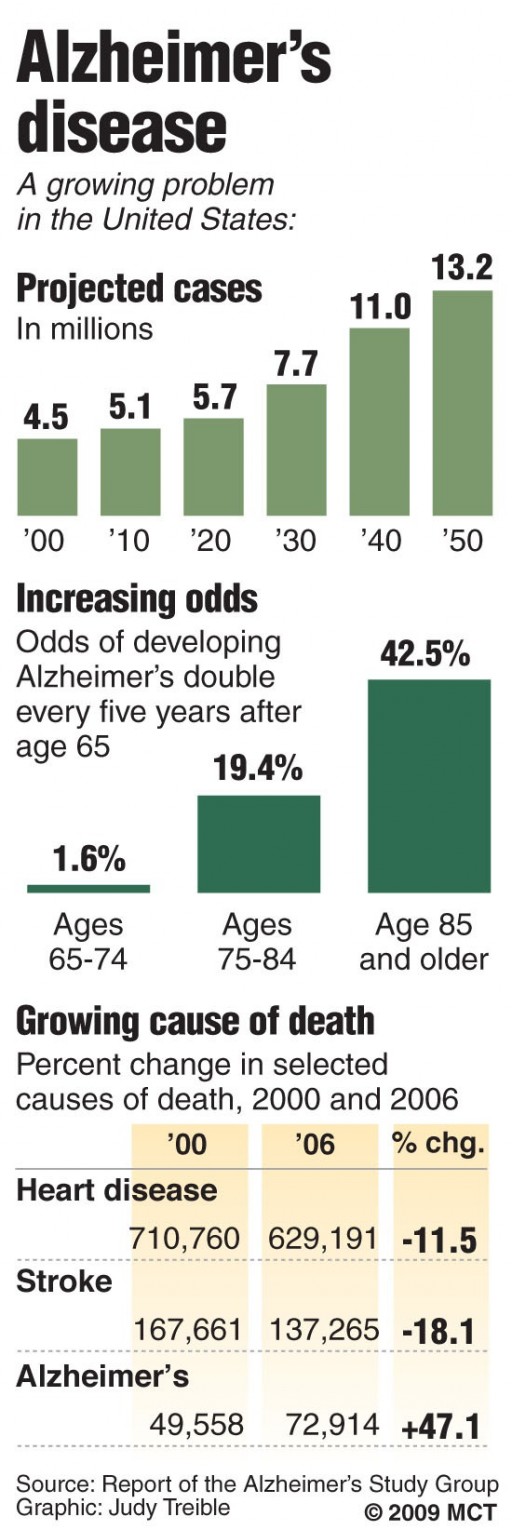
Alzheimers is an inherited type of dementia that can strike people as young as 30 years old. Though there's no cure for early-onset Alzheimers, finding it early makes it possible to control the early and middle stages of the disease and give the best possible quality of life. So what do you do when you suspect signs of Alzheimers?
Step 1- Research your family medical history, whether or not you parents had this disease. Parents have a 50 percent chance of passing on the gene that causes early-onset Alzheimer's. Having the gene doesn't necessarily mean Alzheimer's will develop, but there is an increased risk.
Step 2- Watch for early symptoms especially if a parent has had the disease. People with early symptoms of Alzheimer's often repeat themselves while speaking, lose things and seem generally forgetful. They can get lost going to familiar places and may have increased difficulty performing everyday tasks.
Step 3- Talk to your doctor if you suspect early-onset Alzheimer's. Sometimes, memory loss and confusion can be caused by other treatable illnesses, so the doctor will do a full physical exam, neurological tests and a mental status exam.
Step 4- Have a brain scan (CT or MRI) done if your medical history and symptoms have patterns that indicate Alzheimer's. Often, brain scans are normal in the early stages of Alzheimer's, but there are brain changes characteristic of dementia that might show up.
Step 5- Follow your doctor's recommendations on managing the illness if you or a loved one are diagnosed with Alzheimer's. Medication can slow the progression of the disease, and counseling can help with the psychological effects and help you learn ways to live with the disease. Your doctor might also recommend some lifestyle changes, such as regular exercise or social activities.
It's been difficult and frustrating at times for my Mom so far. I've learned that it's important to help encourage her during those times and keep her engaged in everyday living. It helps so much that she's been handling this all so very well. So we'll continue to follow up with her doctor, and take things as they come. I'm just thankful that I'm able to be home and be here for her along with my husband, kids, and rest of our family and friends who are willing to help in any way that they can. I know that we all, with patience and understanding will be here for my Mom in every step through this journey. We continue to eat healthy, exercise our bodies and our brains with her to do whatever we can to slow this thing down! It's all a learning process that we will all participate in. One thing's for sure, she's not in this alone.


